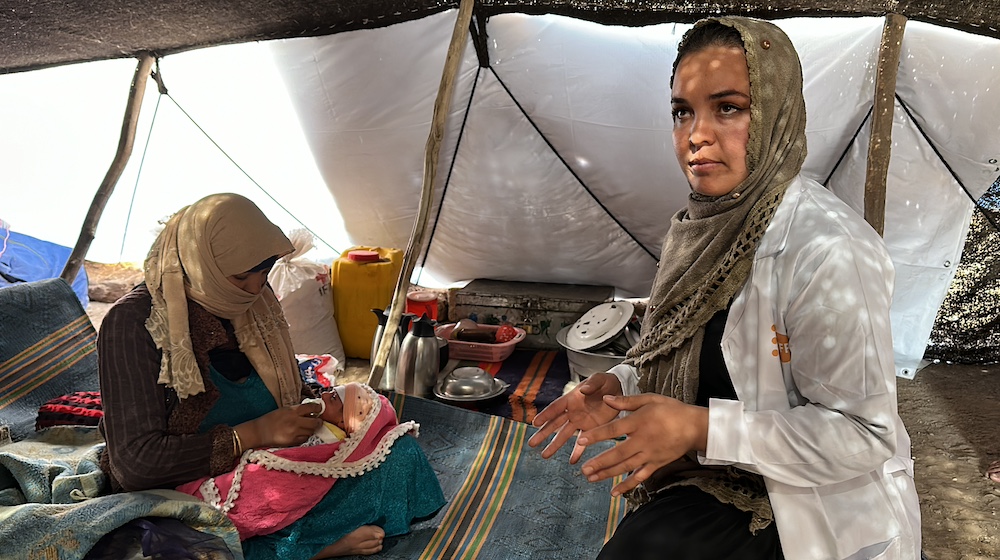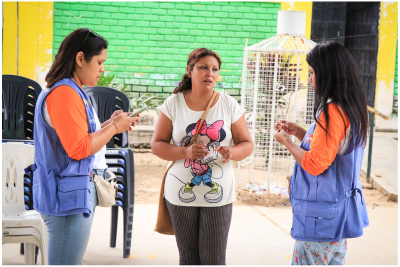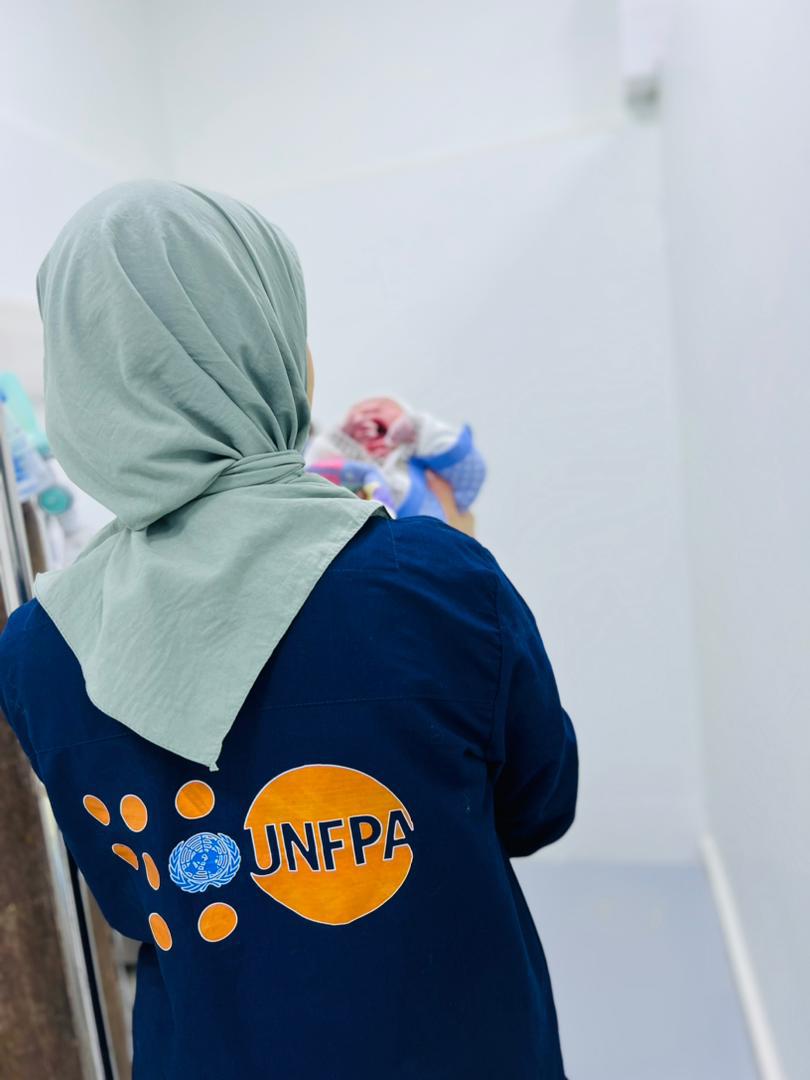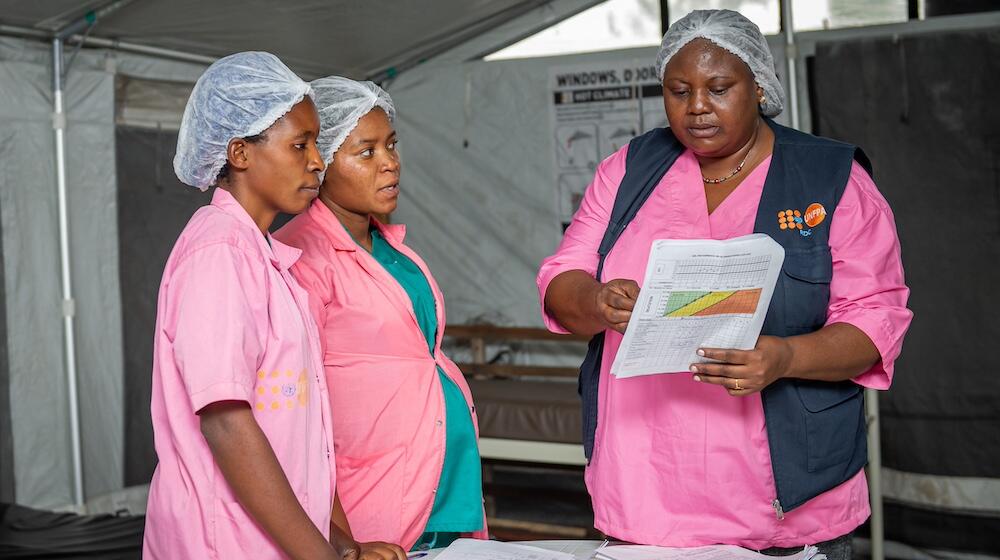UNITED NATIONS, New York – From droughts to floods, displacement and conflicts – the cycle of despair in 2023 seemed unstoppable. Yet in crisis after crisis, so were the accounts of the selfless and the heroic. As 2023 draws to a close, UNFPA, the United Nations sexual and reproductive agency, looks back at just a handful of the people who inspired us and kept us going through a difficult year.
Midwives saving lives
In Bangladesh, pregnant midwife Khadija* urgently needed help. Heavy flooding in the world's largest refugee camp meant that a trained birth attendant couldn't reach her, and the nearest health centres had been forced shut. Pregnancy and childbirth can too often prove fatal in crisis settings, as access to health care, shelter, food and water is severely constrained.

An ambulance was eventually secured to take Khadija to a UNFPA-supported field hospital – where she also works – and staff found her blood pressure had escalated dangerously. Shortly after delivering a healthy baby boy, Khadija began bleeding profusely; without the intervention of her fellow midwives, the situation could have ended in severe illness or death. “Khadija held my hand and thanked me with a full heart,” said midwife Nasrin Khatun. “This is the kind of moment that inspires me more about my profession.”
For Hanifa in Afghanistan, it was in the chaotic aftermath of an earthquake that her contractions began. Her home reduced to rubble, freezing and sheltering in a tent, Hanifa asked, “How can a mother bring a child into this chaos?” Childbirth during displacement can be dangerous – and even more so in the depths of a natural disaster, as pregnant women are forced from their homes, vulnerable to violence, malnutrition and disease and often must give birth without any health-care support. “But then Rahna, the midwife, arrived like an angel,” Hanifa told UNFPA. Rahna guided her through labour and helped deliver her baby safely. “Her words were like a soothing balm for my fears,” Hanifa said. “I went from panic to comfort in moments.”
Hers would be a familiar experience for Maria, a midwife in Morocco’s Atlas Mountains. Maria was working her shift in a maternity health centre when a powerful earthquake struck in early September. “Trapped under the debris, I thought I was going to die,” she told UNFPA. “That night was difficult, but as soon as my colleagues helped me out of the rubble, we all managed to help and save lives.” As she coordinated helicopter evacuations for almost all the pregnant women in the affected area, Maria made sure they received the urgent care they needed. At several points, Maria held multiple lives in her hands: Two women had gone into labour amid the crisis, spurring Maria to gather medicine salvaged from the wreck of the health centre and assist them in safely delivering their babies – one to healthy twins.
Health heroes in conflict zones
In conflict settings, reaching a functioning health facility is often fraught with danger, for both patients and staff. Amid the catastrophic war in Sudan, the country’s remaining hospitals and health centres are a lifeline for pregnant women and new mothers.
Meanwhile, where access is jeopardized, community midwives and skilled birth attendants, many trained by UNFPA, are supporting women to give birth in the safety of their homes. “We are working all day every day across three hospitals. For women and girls who don’t have means of transportation, we go to their homes to ensure they give birth safely,” said Insaf, a midwife in Sudan’s capital Khartoum.
In many complex crises, like the one gripping the Democratic Republic of the Congo, midwives do much more than deliver babies. After a woman and her daughter were raped while collecting firewood near a camp for people displaced by the conflict spreading across their country, midwives Sifa Ndeze and Philomène Siyauswa Kasuera comforted and treated them in a UNFPA mobile health clinic.
They also directed the women to a safe space offering health services and a refuge. Thanks to the midwives’ support and guidance, the women are now learning to dye fabrics, part of a training course in livelihood skills to help survivors of gender-based violence rebuild confidence and earn an income. More than 1 million women this year are at risk of gender-based abuse, particularly sexual violence, in the Democratic Republic of the Congo.
Ms. Ndeze told UNFPA, “As an internally displaced person and midwife myself, working at the mobile clinic means I can continue to practise my profession and help these women.”
Champions amid climate catastrophe
It’s not just in conflict that women and girls face losing protection and health services. When floods ravaged areas of northwestern Peru after Cyclone Yaku earlier this year, survivors of gender-based violence were increasingly worried they could no longer access safe spaces that had been offering them shelter and support.

Community leader María Mercedes Albán Taboada explained that in Peru, fewer than one third of women bring cases of violence to the authorities. “No one is with them, giving them support and the certainty that they are not alone,” she said. Together with UNFPA, Ms. Albán offers women and girls who are vulnerable to violence a refuge and access to essential services. They are supported by legal, psychological and social workers, and dignity kits are provided to help with daily hygiene needs. Ms. Albán said she is determined to break the cycle of harassment and hostility perpetrated by their aggressors: “I will never stop supporting women that seek my help in eradicating violence from their lives.”

The nightmare of crises and their brutal fallout can leave deep physical and mental scars on those who survive them. After two dams burst and a wall of water forced its way through the city of Derna, on Libya’s northeast coast, thousands were killed and whole neighbourhoods rendered homeless. “The hospital was overwhelmed with emergency cases and dead bodies,” said 29-year-old gynaecologist Dr. Nehal Anwar, who was working the nightshift in the city’s maternity hospital when disaster struck. “Even those who had survived were in a critical condition, and some were experiencing vivid visions of being trapped under the floods.”
After working through the night, Dr. Anwar left the hospital the next morning, desperate to find her mother. Despite losing many family members and colleagues, grieving and exhausted, she returned to the hospital every day in the aftermath. “I didn't want to stay at home and feel helpless,” she said. “It is challenging to imagine how we can rebuild and restore the city after such devastating events… The emotional and psychological wounds will take time to heal.”
Defenders of women and girls
The threat of violence, the reality of conflict and the calamity of climate change can all wreak havoc on the dreams and potential of women and girls living through them. After escaping conflict in her village in Ethiopia as well as a stalker intent on marrying her when she was just 14, Ms. Alemtsehay learned about a UNFPA-supported safe house offering shelter and care for survivors like her. “I was relieved to join a place with a supportive environment, counselling, and other resources to help me feel safe and move forward,” she said.
The safe house is able to shelter up to 100 women and girls, all of whom are survivors of rape or intimate partner abuse, or fleeing forced marriages. They provide survivors not just a home and food, but also access to education, medical treatment, psychological therapy and training in vocational skills to rebuild their lives. After four years at the centre, Ms. Alemtsehay said, “I want to attend university and study social work, so I can empower women and girls and support them in leading safe and fulfilling lives.”
Speaking of the heroes across the world who steadfastly deliver from the frontlines of disaster, UNFPA executive Director Dr. Natalia Kanem said, “Their persistence reminds us that the bright light of human possibility refuses to dim, even amid the most challenging circumstances.”


